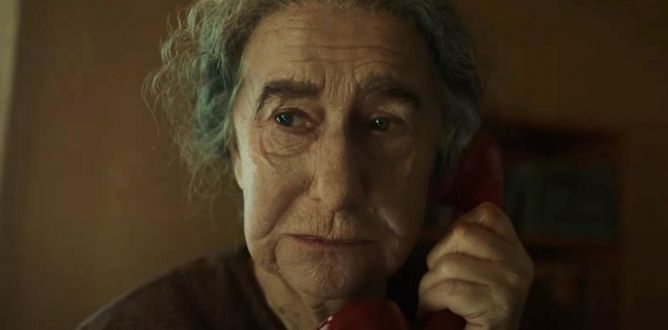Golda Parent Guide
The film informs but fails to transport its viewers into another time.
Parent Movie Review
As the bombs start to fall, Golda Meir (Helen Mirren) realizes that she should have listened to her gut. The Israeli Prime Minister was warned by Mossad (Israeli intelligence) that hostile Arab nations were planning an attack, but military leaders were not convinced. Neither Golda nor her military command wished to appear as if they were launching a pre-emptive strike on their bellicose neighbors. So, despite her concern, Golda only partially mobilized Israel’s troops, leaving the country exposed.
Golda’s worst fears came true on October 6, 1973, when Egyptian troops invaded from the south and Syrian forces attacked from the north, gaining ground and inflicting significant military and civilian casualties on Israel.
To complicate matters, the war began on Yom Kippur, the Day of Atonement, the holiest day on the Jewish calendar. On a day focused on seeking forgiveness, Golda must not only acknowledge her own errors, but lead a nation in a war for its very survival. The chain-smoking, aging prime minister will need to inspire her people, badger the Americans for weapons, and maneuver Israel into the best possible position for a ceasefire. On top of all that, she will endeavor to build the diplomatic scaffolding for a broader peace.
Historical biopics have a specific job to do, of which depicting history is only a small part. History is easy to find – a click of the mouse will give you anything you ever wanted to know about Golda Meir or the 1973 Arab-Israeli War. What a biopic needs to do is give audiences a deep sense of time and place. We need to feel like we know the people on screen and that we hope and grieve with them as we live historic events alongside them. A good historical biopic is transporting – but Golda fails to move its viewers.
A big part of the problem lies with the way Golda’s role is written. Mirren’s strong performance gives us a convincing look at the weight of duty and the inescapable gravity of fatigue. Her Golda is an aging politician, secretly undergoing radiation for cancer while also bearing the burdens of command, uncertainty, and guilt as she battles to save her people. But what her character lacks is passion. We get no sense of the fire that inspires Golda; that keeps her moving through the pain and regret and exhaustion. There’s brief mention of her childhood fear of pogroms and passing references to the Holocaust. The only time she seems really worked up is her insistence that Israel’s neighbors must fear it; they must be too frightened of Israeli military power to ever attack again. But we get no sense of what motivates her – her grandchildren’s future, a sense of historic debt, a love of the land? At the center of the film, Golda remains a cipher.
To make matters worse, other actors are uneven. Standing out for sheer awfulness is Rami Heuberger as Moshe Dayan, legendary eye-patch-wearing soldier and Minister of Defense. His performance is wooden and his panicked responses unbelievable in a man of his experience. To be fair, his lines are dreadful. In one scene he says, in a monotone, “We will crush their bones. We will tear them limb from limb.” Frankly, the lines sound like something from Terminator and they would probably be better delivered by Schwarzenegger. In this film, they just sound ridiculous.
On the plus side, I must credit the production crew for doing well with a small budget. There is no battleground footage – military events are depicted through a combination of news footage and audio contact in defense headquarters. Combat reality is provided without gore, and at low cost. Sets are also limited but are believable. I suspect a large chunk of the budget went towards paying Helen Mirren, which was a good call. If only slightly more had been earmarked for a better script.
Directed by Guy Nattiv. Starring Helen Mirren, Zed Josef, Liev Schreiber. Running time: 100 minutes. Theatrical release August 25, 2023. Updated July 4, 2024
Watch the trailer for Golda
Golda
Rating & Content Info
Why is Golda rated PG-13? Golda is rated PG-13 by the MPAA for thematic material and pervasive smoking.
Violence: There is talk of invasion and frequent news clips of real historical war footage. There are scenes of battlefield explosions. There’s mention of planned suicide in case of capture. Leaders listen as troops are slaughtered on a distant battlefield. A leader wants to arm a nuclear weapon. There is a scene of bloody vomit. A leader threatens mass slaughter. It’s implied that a person has died in a hospital bed. A hallway floor is strewn with dead birds.
Sexual Content: A woman’s back is seen as she sits in the bathtub.
Profanity: There is a handful of minor profanities and terms of deity.
Alcohol / Drug Use: A main character chain smokes cigarettes continuously throughout the film. A main character takes unidentified pills after a traumatic experience. A woman is given an unspecified injection. People drink alcohol in celebration.
Page last updated July 4, 2024
Home Video
Related home video titles:
Winston Churchill leads England against apparently impossible odds as the disaster of Dunkirk unfolds in Darkest Hour.
Trying to make peace between Israel and the Palestinians is a complex task. Norwegian diplomats make an effort in Oslo, a retelling of the backstory behind the 1993 Oslo Accords.
Mossad takes the lead in Operation Finale. In this historical reenactment, a group of agents head for Buenos Aires to kidnap Adolf Eichmann, architect of the Nazis’ “Final Solution”, and bring him back to Jerusalem to stand trial.

